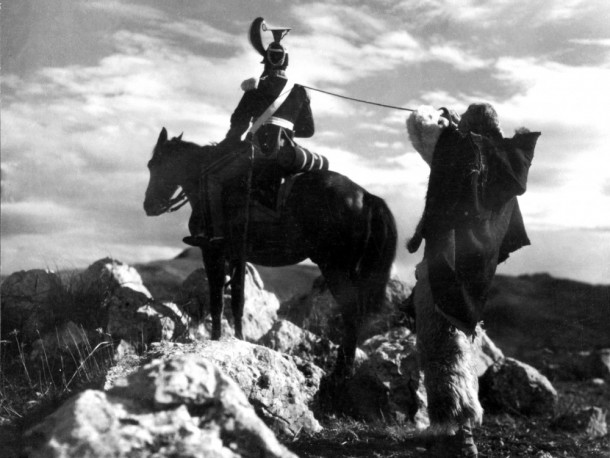
Dir: Alessandro Biasetti | Writer: Alessandro Blasetti, Gino Mazzucchi, Emilio Cecchi | Cast: Giuseppe Gulino, Aida Bellia, Gianfranco Giachetti, Mario Ferrari, Maria Denis, Ugo Gracci | Drama | Italy | 80′
Also known as Gesuzza the Garibaldian Wife, this compact but hugely influential war epic employed non-professional actors in the leads and was largely filmed on location in rural Sicily. The adventure certainly has enough in common with the Post-War Neo-Realist films to be considered a seminal contributor.
Biasetti will always have his detractors and, whilst he was no Leni Riefenstahl, he was certainly a fan of Il Duce. It might perhaps be argued that he was simply a practical filmmaker who understood that if he was going to get a film made at all, he needed to understand which side his bread was buttered; hence a film with an openly nationalistic stance about an almost mythic hero of Italy, Garibaldi.
Two major points of influence in Biasetti’s choices was a rejection of the huge impact of Hollywood films, with their studio-built elaborate sets and massive superstars and instead, the migration towards the aesthetic of recent Russian films, from the likes of Eisenstein and Dovzhenko. Biasetti wanted to get back to what made Italy “Italy’, casting a real shepherd as his lead, wearing traditional Sicilian garb; a film populated by recognisable Italians from up an down the country and with a recognisable country as backdrop.
But Blasetti’s film proved hugely influential beyond just propaganda of the time and has remained iconic. His choice of shot, lighting, design, style and sound have individually and collectively provided much to marvel and influenced not only the Neo-Realist movement, but a great many filmmakers who followed.
1860 concerns the plight of a simple everyman partisan tasked with finding the legendary Garibaldi in his Northern Headquarters and getting him to return to Sicily with him to galvanise the people to repel the King’s hired mercenaries. Leaving his new wife behind, he travels across the whole of Italy and then attempts to petition the peoples’ hero to come help his cause.
This is a quite extraordinary venture despite its modest running time, and loses none of its power in the intervening 80 years. The acting is anything but Historical Drama. There’s a very definite documentary feel to the film, from the use of so many local people and no little art and effort in the construct, folding in emblematic art and shot composition to reflect known and familiar art of the time, with jingoistic anthems and a great attention to detail in costume.
So, apart from being a film of great historical note and no doubt the subject of many a dull college dissertation, 1860 is also a watchable adventure, with a cast of hundreds and one of the greatest battle scenes of all time. Be amazed. AT
AVAILABLE VIA CRITERION AND AMAZON.CO.UK